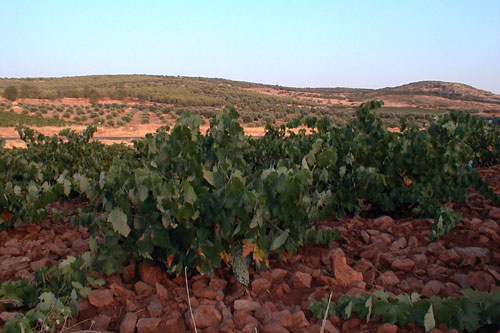Ciudad Real
May 6 - 8, 2025

13
abr 2007
Miguel Pardo, Dean of the Faculty of Economics and Business Sciences of the University of Castilla-La Mancha and Ángela Triguera, Professor of the Spanish and International Economy Area of the same Faculty, will be analyzing "The Vineyard in Castilla-La Mancha and the Regional Economy". This event will take place at the round table at FENAVIN 2007, National Trade Fair on Wine, from May 7th to the 10th at the Ciudad Real Trade Fair Pavilion.
Miguel Pardo, who is also Doctor in Applied Economy and expert in regional economy, will be leading a historical retrospective analysis of the vineyard in Castilla-La Mancha, covering the period ranging from the end of the 19th century right through to current times. "History teaches us that sometimes things have not been properly done and that we have been unable to overcome the problems arising in the regional economy, and this not only because of a lack of investment, but also due to many other reasons", he comments.
Said historical analysis will be divided into four important stages. First of all covering the expansion period (from the end of the 19th century until the forties), a period based on a cereal-production model. The second phase covers the forties until 1985 (Franco regime and transition) during which a "cooperative boom" took place. "The problems of the private winery owners were resolved, yet failures continued in matters involving commercialization, amongst others", he adds.
Finally the third stage will be analyzed, which encompasses from 1986 to 2006, coinciding with Spain's incorporation to the European Union. "During this period modernization of the facilities and equipment took place, which for some companies (cooperatives and wineries) was excessive. It also gave rise to an increase in the quality of the product".
"During the last 20 years some marginal areas have been left out, with the management area being an example. Innovation must take place and this has not been done. On top of this we have not promoted our wines outside of our borders. Thus we find ourselves with these two problems: promotion of the final product and lack of innovation on the part of the cooperatives. The latter have simply remained as they were", he emphasizes.
WEAKNESSES AND THREATS OF THE REGIONAL ECONOMY'S CURRENT SITUATION
On her part, Ángela Triguero, expert in agricultural economy, will be setting-out the fourth stage covering analysis of the vineyard in Castilla-La Mancha, mentioning the weaknesses and threats that the current situation represents. "We find ourselves with a crop that is competitive per quality, price and per diversity", in the words of Miguel Pardo.
The Professor will also be analyzing the Wine COM (Common Market Organization); the effects of the same over the economy once it is approved and alternatives that cause "unfavorable" effects" for the vineyard, this according to the Dean. Likewise, the problems encountered by the viniculture and cooperative sector in the region will be covered.
Experts in regional and agricultural economy will be debating why cultivation of the vineyard is concomitant for the regional economy. Pardo puts forward three reasons: because it is the most competitive and without alternatives in one of the least developed regions in the EU. Because if added to the consequences of the climate change we reduce cultivation of the agricultural sector, this will represent effects over the region's social and economic sustainability, and finally, unlike other agricultural crops, this crop represents effects that offer opportunities related with rural tourism, gastronomic resources, etc.
WINE, A SIGN OF DISTINCTION
"Wine is perceived as a product of a certain social level, as a sign of distinction", he assures. "Wine-related tourism in the region is another of the resources that other types of agricultural crops we have are lacking".
Altogether, the Dean of the Faculty of Economics manifests that the current situation of the regional economy has good aspects, although it also has concerning aspects. "We have a competitive product. Other countries in the wine-growing sector do not have the same opportunities that we have. For example, climate: our vineyard is found on dry lands. We also reduce production by increasing quality. Our vineyard is more competitive, more profitable".
"The situation is a negative one, however, it depends on the vine-growers and on the wineries. Here we have alternatives that other regions do not enjoy and we must profit from them. Promotion is fundamental: we must create distribution networks in the region, as has likewise been the case with other industrial products, thus, why not do the same with wine?" he concludes.
We use our own and third-party cookies to manage the website, obtain information about its use, improve our services or to show you advertising according to your preferences. You can click on ACCEPT, to allow the use of all cookies, or on settings to see the cookies in detail and indicate which ones you want to accept or reject. +info
Settings